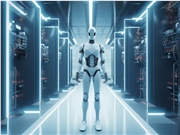In the hallowed halls of mathematics, Google DeepMind has once again demonstrated the extraordinary capabilities of its AI. Recently, Google's AI secured a silver medal in the International Mathematical Olympiad (IMO), a feat that has not only stunned the mathematical community but also sparked boundless imagination about the future of AI.
Google's AlphaProof and AlphaGeometry2 made remarkable performances in the IMO 2024 competition. They correctly solved four out of six problems, narrowly missing a gold medal by just one point. Even more astonishing is that AlphaGeometry2 solved a geometry problem in a mere 19 seconds, a speed and accuracy that even top human mathematicians would find challenging to match.
This achievement has not only caused a stir in the AI community but has also caught the attention of legendary figures in mathematics. Fields Medal winner Terence Tao and former IMO USA team leader Po-Shen Loh have both given high praise to Google's AI performance. Tao believes that DeepMind's work has expanded the boundaries of AI's capabilities in the field of mathematics, while Loh compared this震撼 to the feeling of the Soviet Union's first artificial satellite, Sputnik.

The CEO of Perplexity AI even boldly predicted that if Google continues to delve into AI mathematics, it could potentially create an "AI Terence Tao" in the future. Tao himself is more focused on how AI and mathematics can develop together. He believes that the progress of AI in mathematics will help automate formalized mathematics and propel the advancement of mathematical research.
DeepMind's approach to this development is very clever; they rely more on reinforcement learning rather than large language models, in a way that inherits the spirit of AlphaGo. Through formal methods, AI can solve IMO-level geometry problems, something that was unimaginable before.

Professor Po-Shen Loh believes that AI's powerful mathematical abilities pose new challenges to educational methods. The existing educational structure needs to undergo rapid transformation to adapt to the demands of the AI era. He emphasizes that everyone must learn to solve new problems they have never encountered before, or they will not be able to keep up with the pace of AI.
Google's AI performance at IMO is not only a technological breakthrough but also a profound revelation about human intelligence. With the continuous advancement of AI technology, we have reason to believe that future mathematical research and education will undergo earth-shaking changes. Let us look forward to how AI will continue to create miracles in the field of mathematics.










